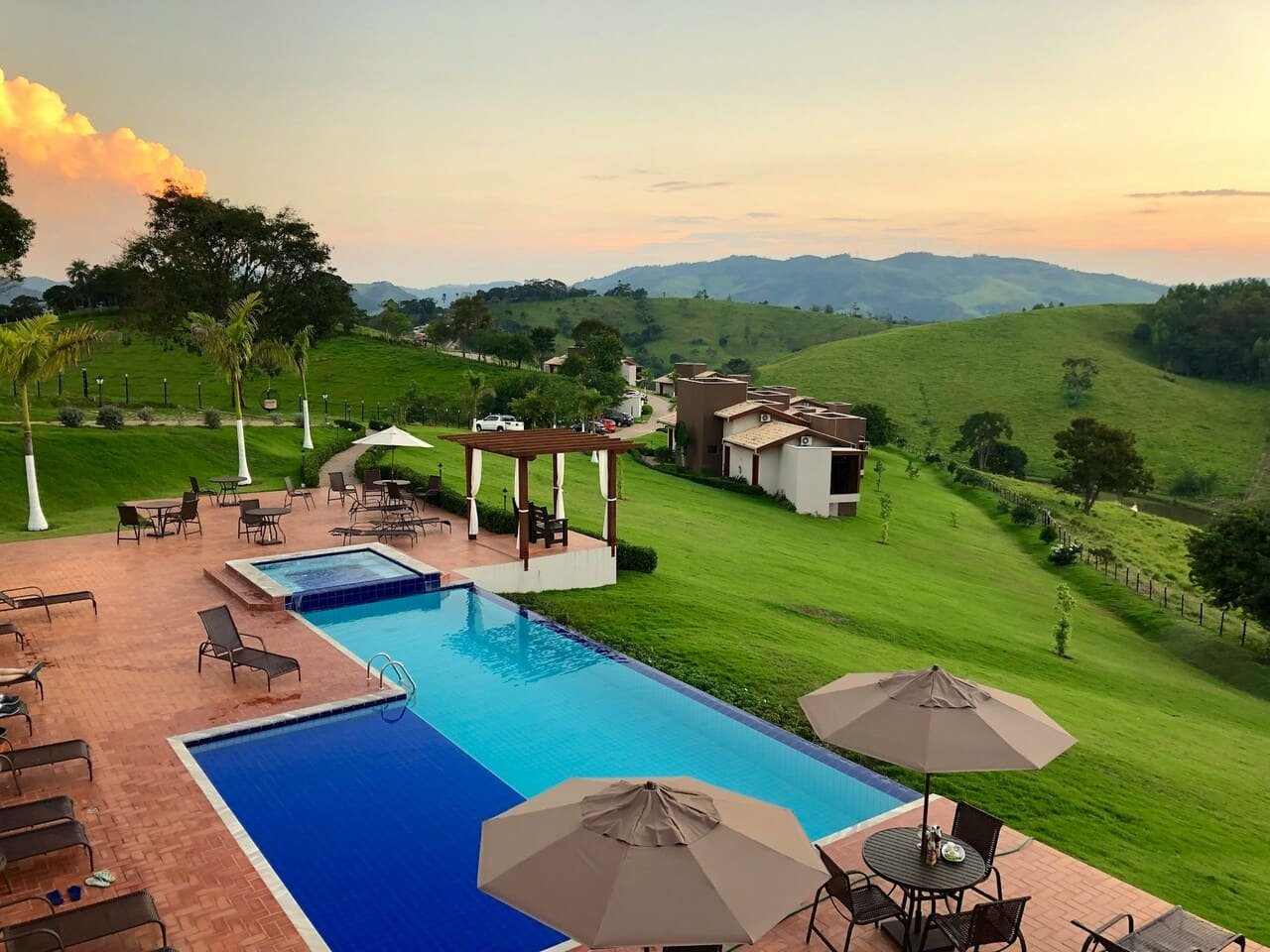Did you know the average hotel room consumes a staggering 73,000 gallons of water annually? Eco-friendly hotels are changing this wasteful narrative while still delivering unforgettable experiences.
When you think of sustainable accommodations, you might imagine basic amenities and sacrificed comfort. However, today’s environmentally friendly hotels are redefining luxury with stunning properties like Saffire Freycinet in Australia, which has replanted over 30,000 native plants, and innovative concepts like Svart Hotel, designed to save 85% of its annual energy consumption. Fortunately, sustainable luxury hotels are proving that responsible travel doesn’t mean compromising on quality.
From properties powered entirely by wind energy to resorts where over half the building materials are reclaimed, green hotels are revolutionizing how you experience premium hospitality. In fact, LEED-certified hotels use 26% less energy, 33% less water, and send 50-75% less waste to landfills — all while providing exceptional stays that satisfy both your conscience and comfort expectations.
Table of Contents
What defines a sustainable luxury hotel?
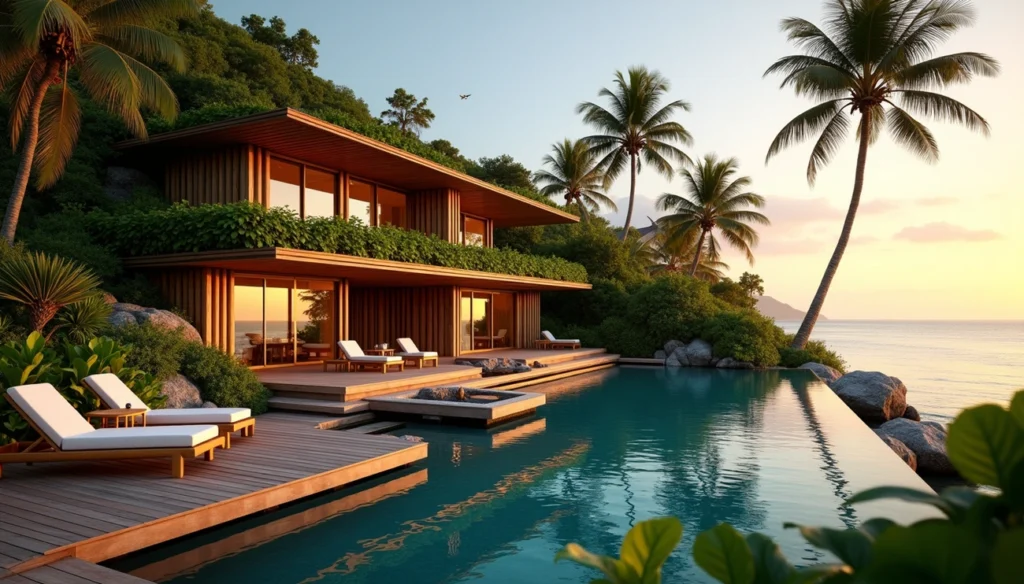
True luxury today means indulgence without environmental cost. Sustainable luxury hotels go beyond basic eco-friendly initiatives, creating extraordinary experiences that protect our planet.
Eco-conscious architecture and materials
Buildings account for 38% of global energy-related carbon emissions and 50% of all extracted materials. Consequently, sustainable luxury hotels start with thoughtful design that works in harmony with their surroundings. These properties focus on green architecture that reduces environmental impact through innovative design and careful material selection.
Related read: Biodegradable Travel Products That Actually Work
The finest eco-friendly hotels prioritize construction materials that minimize ecological footprints. Many utilize:
- Reclaimed wood (often from old distilleries or factories)
- Locally harvested bamboo and other rapidly renewable resources
- Recycled glass and concrete
- Low-VOC paints to ensure healthy indoor air quality
Unlike conventional hotels, sustainable properties blend seamlessly with their natural settings. The Pier Maua in Brazil demonstrates this concept perfectly, using water from the surrounding area to regulate interior temperatures. Additionally, many eco-conscious hotels incorporate natural ventilation, green roofs, and passive heating/cooling systems that reduce energy needs without sacrificing comfort.
Renewable energy and water systems
Energy efficiency forms the cornerstone of any truly sustainable hotel. Hotel Marcel in New Haven stands as a prime example, running entirely on renewable electricity and using two-thirds less energy per guest than the regional average. This fossil-free approach proves that green energy is both viable and cost-effective.
Forward-thinking properties employ solar panels, wind turbines, and innovative energy management systems to slash their carbon footprints. Some generate enough renewable power to return excess to the local grid. For instance, Hyatt-owned hotels have transitioned to 100% renewable electricity through Green-e Energy-certified Renewable Energy Certificates, reducing approximately 43,000 metric tons of greenhouse gas emissions annually.
Water conservation represents another essential component, with eco-luxury hotels implementing:
- Rainwater harvesting systems
- Greywater recycling for landscaping
- Low-flow fixtures that maintain luxury performance
- Smart water management technology
Locally sourced food and ethical supply chains
The culinary experience at sustainable luxury hotels extends beyond taste to embrace responsible sourcing. Farm-to-table dining has become fundamental, with many properties growing produce in on-site organic gardens or sourcing from nearby farms. This approach not only reduces transportation emissions but also supports local economies.
Accor Hotels, serving over 200 million meals annually, exemplifies this commitment with ambitious targets: 50% vegetarian options by 2030, 60% less food waste by 2030, and 100% responsibly sourced coffee, tea, and chocolate by 2030. Their “farm to fork” philosophy prioritizes seasonal ingredients and animal welfare.
Ethical supply chains also encompass everything from bed linens to bathroom amenities. Six Senses Hotels, Resorts, and Spas demonstrates this holistic approach through its comprehensive sustainable procurement program. Each property conducts initial and annual reviews of suppliers, sets improvement targets, and engages partners in enhancing practices. This attention to detail extends to eliminating non-certified palm oil and developing sustainable fishing education programs for local fishermen.
These core elements – thoughtful architecture, renewable systems, and ethical sourcing – combine to create luxury experiences that satisfy both discerning travelers and environmental responsibilities. For the modern luxury traveler, true indulgence comes with the peace of mind that their stay supports rather than harms our planet.
The hidden perks of staying green
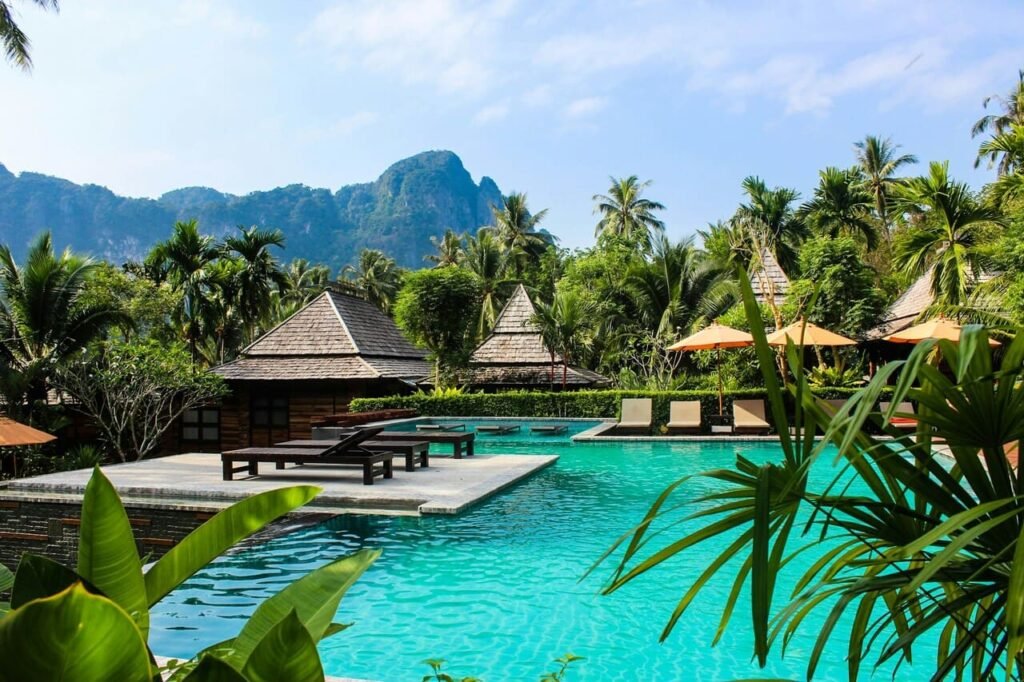
Beyond the environmental benefits, booking a stay at an eco-friendly hotel offers unexpected rewards that enhance your overall experience. These hidden advantages often become the most memorable aspects of your journey.
Healthier environments and cleaner air
Stepping into a sustainable hotel means breathing easier—literally. Green-certified hotels create cleaner indoor environments where you can breathe safer air with reduced exposure to harmful chemicals. This focus on air quality stems from rigorous standards regarding cleaning products, building materials, and ventilation systems.
Your body will thank you for these healthier surroundings. Sustainable properties frequently report happier, healthier work environments that boost employee morale and enhance staff retention. This positive atmosphere directly influences your experience as a guest, since content staff typically provide better service.
Many eco-conscious hotels go beyond basic air filtration by incorporating living walls, abundant indoor plants, and natural ventilation systems. These features not only purify the air naturally but also contribute to the visual beauty of the space. Several properties have eliminated volatile organic compounds (VOCs) from their interiors entirely, replacing conventional paints and furnishings with non-toxic alternatives.
Unique, immersive nature experiences
Eco-friendly hotels typically situate themselves in pristine natural settings and make every effort to keep them that way. This intentional placement allows you to enjoy stunning views and a more peaceful environment than you’d find at conventional properties.
Your stay often includes exclusive access to remarkable experiences:
- Expert-led wildlife walks at sunrise to observe local species
- Behind-the-scenes tours of conservation projects led by resident marine biologists
- Opportunities to participate in reef cleaning programs or coral regeneration
At the heart of these experiences lies a deeper connection with nature. Given that most eco-resorts are set in secluded areas, you’ll engage with the natural world intimately while simultaneously unwinding and disconnecting from everyday life. Imagine kayaking alongside pristine coral reefs or taking guided treks through palm forests—activities that combine adventure with environmental appreciation.
Supporting local communities and cultures
Sustainable hotels serve as guardians not only of the environment but equally of local culture. By staying at these properties, you actively contribute to preserving cultural heritage and creating jobs in surrounding communities.
You might like: A Traveler Hired the Wrong Tour Guide and Lost $2,000
The most committed eco-hotels employ over 90% of their staff from neighboring communities, ensuring tourism directly benefits local economies. Your vacation dollars ripple through these communities in meaningful ways, from supporting artisans who crafted your room’s decor to the farmers who grew your breakfast ingredients.
Experience authentic cultural immersion through activities like traditional cooking classes, pottery workshops, and storytelling sessions led by community members. These interactions enrich your travel experience immeasurably, offering insights no guidebook could provide.
The next time you choose eco-friendly accommodations, remember you’re gaining much more than a reduced carbon footprint. You’re investing in your wellbeing, connecting deeply with nature, and empowering communities—rewards that transform an ordinary vacation into a meaningful journey.
8 eco-friendly hotels that feel like paradise
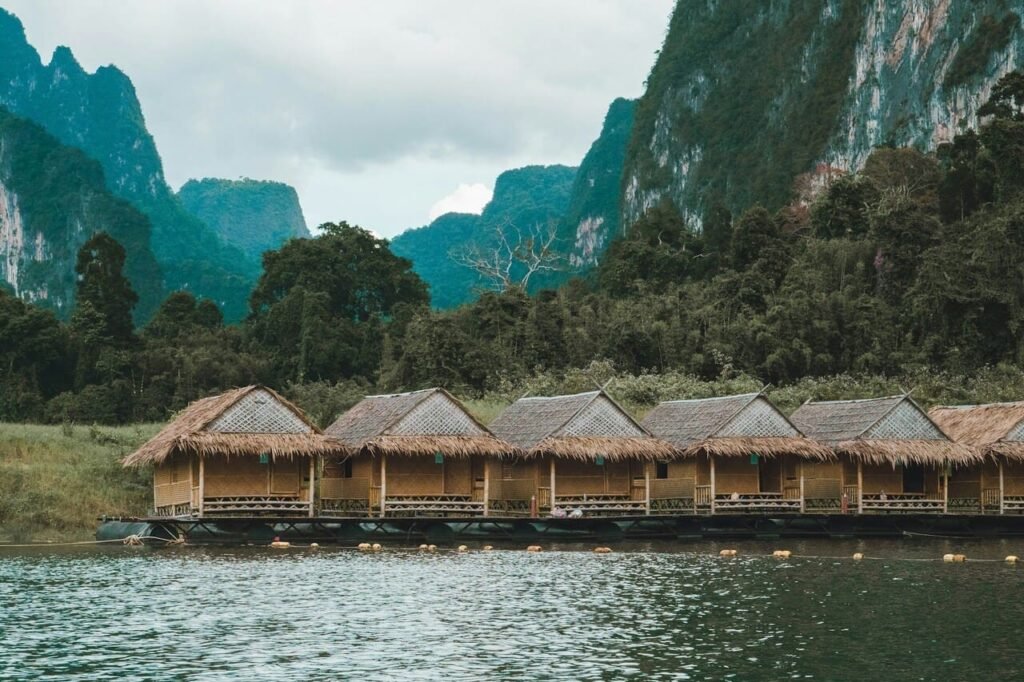
Ready to experience paradise without the guilt? These eight eco-friendly hotels don’t just talk sustainability—they live it through innovative design, thoughtful practices, and deep connections to their natural surroundings.
1. COMO Laucala Island, Fiji – 86% self-sustained
Paradise gets practical at this private island, where 80% remains undeveloped to preserve natural ecosystems. Throughout the 25-villa property, you’ll experience farm-to-table dining in its purest form—86% of all food comes from the island’s own 240-acre organic farm, which cultivates diverse crops and responsibly raises livestock, including Wagyu cattle, chickens, and quail. Beyond dining, your complimentary massages and meals come with the reassurance that rainwater harvesting and renewable energy power much of your stay.
2. Bambu Indah, Bali – Jungle luxury reimagined
Nestled in Bali’s lush jungle, this architectural masterpiece showcases what’s possible when creativity meets conservation. The property features 24 whimsically designed houses, including teak bridal homes transported from Java and shell-shaped spirals of bamboo. Throughout the grounds, you’ll discover permaculture gardens, replanted rice fields, and natural ventilation instead of air conditioning. Moreover, the open-air bathrooms and bamboo ceiling fans connect you intimately with nature while maintaining luxurious comfort.
3. The Hideout, Thailand – Treehouse tranquility
Tucked away on sleepy Koh Yao Noi island, this tech-free haven invites you to truly disconnect. The four treehouse villas, barely visible amongst towering trees, offer 270-degree views of Phang Nga Bay. Each Thai-style lodge is constructed with eco-friendly building materials sourced from the island itself and crowned with palm leaf roofs. Naturally, the property runs entirely on renewable energy, offering an authentic “away from it all” experience enhanced by yoga retreats and traditional Thai cuisine.
4. Tri Lanka, Sri Lanka – Lakeside serenity
Hidden in Sri Lanka’s southern province, this architectural gem juts out into the still waters of Lake Koggala with mind-blowing volcano views. Built with sustainable materials and practices, Tri features living walls, green roofs, and buildings made entirely from local materials and 100% recycled wood. Water is solar-heated, and transfers happen by traditional fishing boat rather than motorized vehicles. Throughout your stay, the focus remains on wellness, with an open-sided yoga shala floating above a bamboo grove.
5. The Kip, Sri Lanka – Surf and sustainability
Just a short walk from “Secret Beach” in Ahangama, this humble hideaway embodies slow, sustainable living. The colonial-era bungalow houses just four airy rooms decorated with locally sourced, handmade objects that champion regional craftsmen. Solar hot water panels, effective fans instead of AC, and a strict no-plastic policy demonstrate their commitment to conservation.
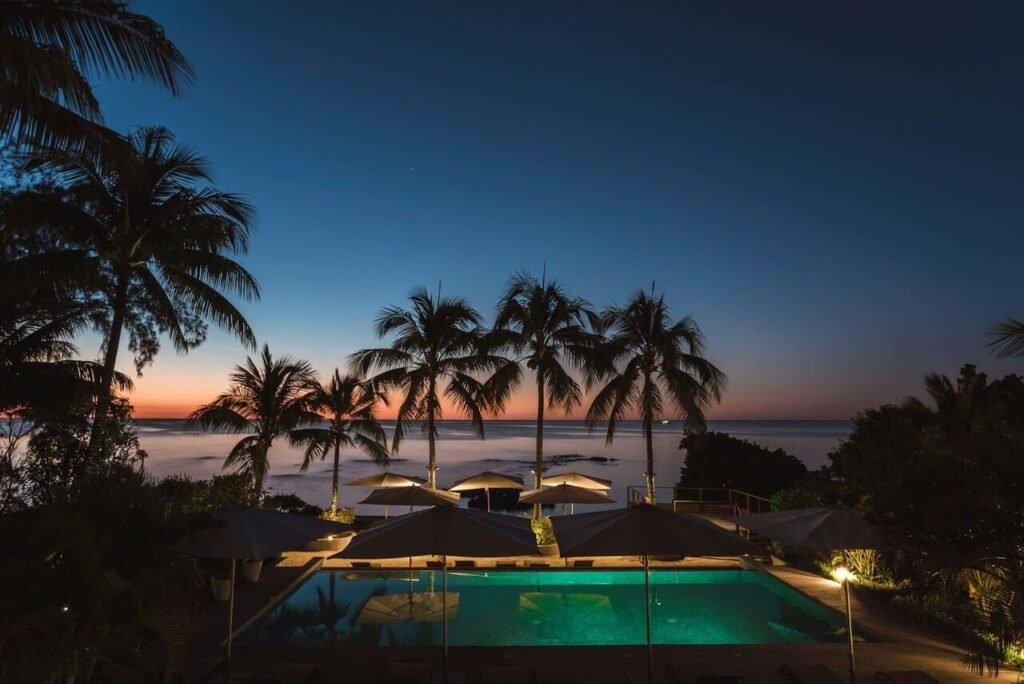
What truly sets The Kip apart is its garden café, which serves health-oriented meals from their own vegetable patch, making this surfer’s paradise a genuine farm-to-table experience.
6. Cempedak Island, Indonesia – Bamboo elegance
This adults-only private island retreat features 20 spectacular villas handcrafted from bamboo with vernacular ‘alang alang’ grass roofs. Each spacious villa features a private plunge pool and offers either direct beach access or stunning sea views. Behind the scenes, the resort runs on natural ventilation, solar panels, and battery banks, operating as almost entirely zero waste. Impressively, only one-third of the 17-hectare island was developed—the remaining primary rainforest serves as a sanctuary for rare species like pangolins and silver leaf monkeys.
7. Jicaro Island Lodge, Nicaragua – Hurricane-salvaged chic
This magical nine-casita retreat on Lake Nicaragua earned its place in National Geographic’s top 25 ecolodges worldwide. The entire property was built from timber reclaimed from trees downed during Hurricane Felix. Behind its beauty lies serious sustainability credentials: wastewater is filtered for drinking, solar panels heat water, the pool runs chlorine-free, and underground electrical rigging protects wildlife. These same solar panels extend benefits beyond guests, helping to light a nearby school and health center.
8. Shinta Mani Wild, Cambodia – Adventure with a cause
Deep within Cambodia’s Southern Cardamom National Park, 15 luxury tents perch dramatically over rapids and waterfalls. The adventure begins immediately—you can arrive via Cambodia’s second-longest zipline. Behind the scenes, your stay directly funds Wildlife Alliance rangers who patrol the forest, preventing poaching and illegal logging. Even the dining experience champions sustainability, with meals crafted from ingredients foraged from the surrounding forest. Previously, throughout time, many staff were former poachers and loggers who now use their regional knowledge to protect rather than exploit this precious ecosystem.
How to spot greenwashing vs real sustainability
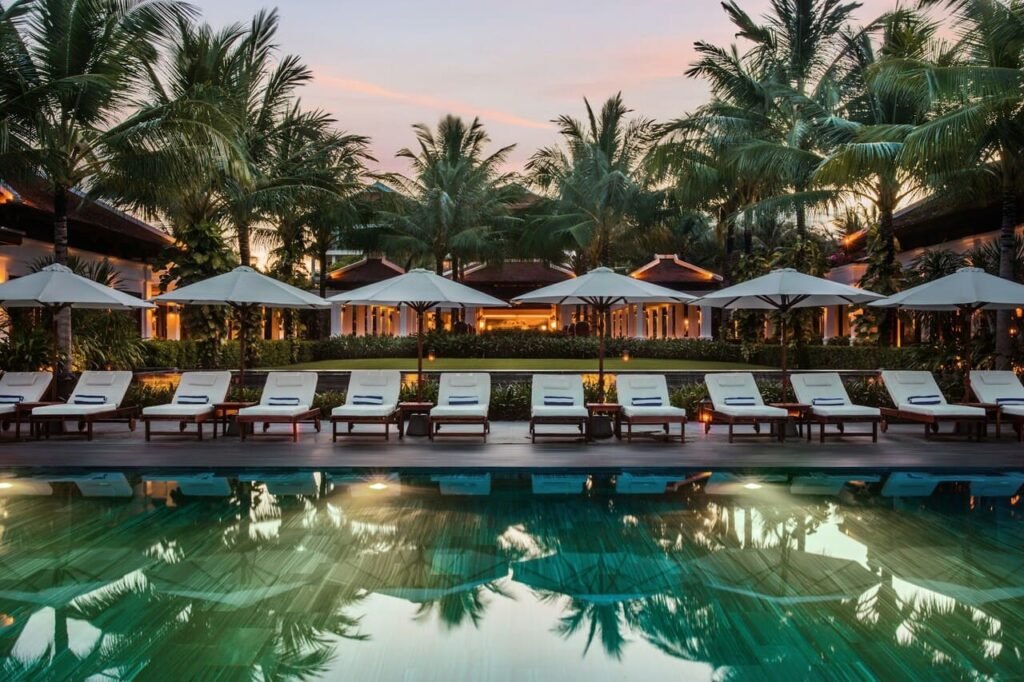
As eco-tourism grows in popularity, so does the challenge of distinguishing genuine sustainability from clever marketing tactics. Knowing what to look for helps ensure your vacation supports truly green practices.
Red flags to watch for in hotel marketing
Be skeptical of properties that use buzzwords like “eco-friendly” or “green” without specifying concrete actions. Authentic sustainable hotels provide transparent, verifiable initiatives rather than vague claims. At the same time, watch for properties that highlight minor efforts—like towel reuse programs—while ignoring larger environmental impacts. If disposable plastic toiletries and individually wrapped items appear throughout a property advertising its “sustainability,” you’re likely witnessing greenwashing.
Questions to ask before booking
First, inquire about specific sustainability metrics and improvement targets. Legitimate eco-friendly hotels track their progress with measurable goals. Ask pointed questions about:
- Energy efficiency programs and renewable energy sources
- Water conservation methods beyond towel reuse
- Waste management and recycling policies
- Percentage of local staff and fair wage practices
These questions often reveal whether sustainability is a core value or merely a marketing angle.
Certifications that prove commitment
Essentially, third-party verification offers the strongest evidence of authentic practices. Look specifically for certifications from accredited bodies like EarthCheck, Green Globe, or those recognized by the Global Sustainable Tourism Council. Certification confirms a hotel meets exceptional standards through an independent assessment. Therefore, when a property displays certification from an accredited body, you can trust that its environmental claims have been properly verified.
Planning your eco-luxury trip
Turning vacation dreams into eco-conscious reality starts with mindful planning that doesn’t sacrifice luxury for sustainability. With careful preparation, your green getaway can be both indulgent and responsible.
Best times to visit eco-destinations
Opt for off-peak seasons whenever possible—this choice not only helps combat overtourism but often delivers a more authentic experience. India’s climate varies dramatically by region; pack accordingly with light-colored clothing for summer visits and raincoats during the monsoon season. Although traveling during shoulder seasons might mean unpredictable weather, these periods typically offer better rates alongside fewer crowds.
Packing tips for sustainable travel
Consider the three Rs—reduce, reuse, recycle—before filling your suitcase. Pack thoughtfully with:
- A reusable water bottle and coffee cup to minimize waste
- Plant-based toiletries like mineral sunscreens containing natural ingredients
- Multi-purpose clothing made from sustainable materials such as TENCEL lyocell or organic cotton
Prioritize items you already own first, coupled with new purchases from B Corporation brands that meet high environmental standards. For tech essentials, look for accessories made from recycled plastics.
How to reduce your footprint while enjoying luxury
Choose trains over flights whenever feasible, as they generate significantly fewer emissions. According to the EPA, trains account for merely 2% of transportation emissions compared to planes’ 9%. For necessary flights, research airlines committed to reducing their carbon footprint or invest in carbon offset programs that support renewable energy projects. Throughout your stay, embrace simple daily practices—refuse straws when ordering drinks and carry reusable shopping bags for souvenirs.
Final Words
The transformation extends beyond simply reusing towels or installing a few solar panels. Actually, the most impressive eco-luxury hotels have reimagined hospitality from the ground up, with thoughtful architecture that works with nature rather than against it. Renewable energy systems power indulgent experiences while locally-sourced meals delight your palate without harming the earth.
Beyond the obvious environmental benefits, you now understand the hidden perks that make these stays truly special. Cleaner air and healthier surroundings enhance your wellbeing. Meanwhile, unique nature experiences connect you more deeply with your destination. Additionally, your vacation dollars support local communities, creating a positive ripple effect that extends far beyond your stay.
The 8 featured properties—from Fiji to Cambodia—showcase just how diverse sustainable luxury can be. Each offers its own distinct flavor of paradise while sharing a common commitment to environmental stewardship. Whether you prefer a bamboo treehouse in Bali or a dramatic tent perched over Cambodian rapids, these hotels deliver unforgettable experiences coupled with peace of mind.
Your next vacation needn’t involve compromise. Following the planning tips outlined earlier, you can craft a getaway that feels both indulgent and responsible. The future of travel undoubtedly leans toward this harmonious balance between luxury and sustainability—where unforgettable experiences come without the weight of environmental guilt. Why not be part of this positive change on your next adventure?
Key Takeaways
Sustainable luxury hotels prove you can enjoy premium experiences while protecting the planet, offering cleaner environments, unique nature access, and community support beyond basic eco-initiatives.
• True eco-luxury goes beyond towel reuse – Look for hotels with renewable energy, locally-sourced materials, and measurable sustainability metrics rather than vague “green” marketing claims.
• Green stays offer hidden health benefits – LEED-certified hotels use 26% less energy and provide cleaner air through non-toxic materials and natural ventilation systems.
• Your vacation dollars create a positive impact – Eco-friendly properties typically employ 90% local staff and support community projects, making your stay a force for good.
• Verify authenticity through third-party certifications – Look for EarthCheck, Green Globe, or Global Sustainable Tourism Council certifications to ensure genuine environmental commitment.
• Plan mindfully for maximum impact – Travel during off-peak seasons, pack reusable items, and choose trains over flights when possible to reduce your footprint while maintaining luxury.
The future of travel lies in this perfect balance where unforgettable experiences come without environmental guilt—transforming how we think about premium hospitality.
FAQs About Eco-friendly Hotels
What defines a sustainable luxury hotel?
It’s a high-end hotel that uses eco-friendly practices—like green design, renewable energy, and local food—while still offering a top-tier guest experience.
Are eco-friendly hotels as comfortable as traditional luxury hotels?
Yes! They’re often just as luxurious, with beautiful design, natural materials, and healthier, more relaxing environments.
How can I verify if a hotel is truly sustainable and not just greenwashing?
Check for trusted certifications like EarthCheck or Green Globe. Ask about their energy use, waste policy, and local support—real eco-hotels are transparent.
What are some unexpected benefits of staying at an eco-friendly hotel?
You’ll often enjoy cleaner air, deeper nature experiences, and a stronger connection to local culture—making your stay more meaningful.
